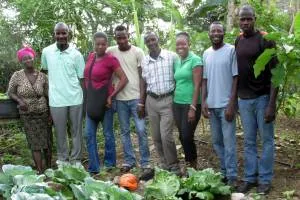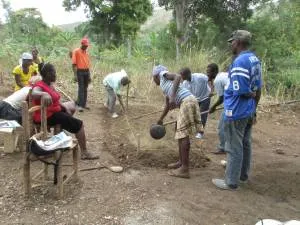Changes
A letter from Mark Hare in the U.S. on Interpretation Assignment from Haiti/Dominican Republic
Dear Friends,
As Jenny noted in her recent letter, we have been going through many changes as a family since we arrived in the United States last June.
One of those changes for me has been how I interpret my work as a mission co-worker to the congregations that we visit. For most of my time as a mission worker, I have been doing mission interpretation by myself. Working as a team with Jenny to put together our story has been an enormous improvement. For example, Jenny has helped me focus on the importance of creating spaces that can provide opportunities for deep conversations and help us develop real relationships with congregations here in the States just as we develop deep relationships with the communities where we serve in Haiti and the Dominican Republic. My style of interpreting mission has tended toward presentation, while Jenny has focused on dialogue. This has pulled me out of my comfort zone and that’s the point. It is by moving out of our comfort zones that we can stretch ourselves, begin to grow, and create more space within ourselves for the Holy Spirit to blow through.

While Jenny, Keila, Annika and I have developed new and deeper relationships with people here in Amesville, Ohio, where we are living for the year, Jenny and I have continued to be in touch with our respective communities in the Dominican Republic and Haiti. Jenny has had numerous phone conversations with friends in Batey 7, where she has been serving at the invitation of the Dominican Evangelical Church (IED) since March 2012. Batey 7 is one of the communities of Dominicans descended from Haitians brought to the Dominican Republic to harvest sugar cane. News from Batey 7 has been positive. The Community Health Evangelism Committee of Batey 7 continues to develop its vision of a new community. They have now received official recognition as a community organization from the municipal officials. Jenny tells me that this is an important step; it makes the group more visible to the other members of the community, and it also gives them more authority to speak on behalf of the village.
Since December 2014 the committee has had as one of its primary goals the improvement of the houses of a number of families in the Batey 7 who simply don’t have the resources to repair their homes without assistance. The main focus of the committee has been roofs. In February of 2015 the committee was able to help three families improve their roofs and their goal for 2015 was to help another ten.
Another significant challenge that the committee is working on is organizing a School Health Screening the first week of February 2016. Jenny and I have been keeping a lot of cell phone signal towers busy with phone calls to various individuals who will need to be involved. During the screening the volunteers involved will measure the height and weight of each child as well as test blood, urine and stool samples for anemia, diabetes and various types of parasites. If by God’s grace everything comes together, we believe the screening can lead to fundamental changes in Batey 7. It will provide the committee simple and clear information about the health of their village’s children. Together with the community, they can then determine what the next step should be; with the baseline information they also will be able to measure the impact of any activity or program that they decide to carry out.
Like Jenny, I have been in touch with my colleagues in Haiti every month and usually every week, particularly with Herve Delisma, the colleague from our partner MPP (Farmer Movement of Papaye) who worked side by side with me preparing for and carrying out the work of the Yard Garden Program from April 2012 until June 2015. Without Herve´s support I would never have been able to organize the work in Haiti during the two or three weeks I was in the Dominican Republic each month. Now I am the one supporting Herve as he helps plan the logistics of transportation and materials and leads the Haitian teams that visit Léogâne, 30 miles west of Port au Prince; Verettes, 60-70 miles northeast of Port; and Bayonnais, about 80 miles directly north of the capital.
I am particularly impressed by Herve’s work in early December. Herve put together a plan for one-day workshops in each of six communities located in the hills and mountains surrounding MPP’s national training center in Papaye-Hinche. Herve coordinated the respective workshops with the six members of the Road to Life Yard team, one or two from each community. He also brought in guest instructors from Léogâne, Verettes and Bayonnais and arranged for the purchase of materials. The materials included 60 old tires to be used as planters, which he had to go collect in a city about an hour away, bring them back to the Papaye area, and then distribute them, ten at a time, here and there throughout the hills of Papaye-Hinche.

Herve’s team of instructors for the one-day workshops provided hands-on training for a series of basic yard garden techniques, including building raised beds, setting up vegetable tires, and making the soil mix, including biochar, a type of biologically active crushed charcoal. At the end of each workshop the participants evaluated their day and they were very pleased; the main critique they mentioned was that one day was really not enough.
Jenny and I want to express how grateful we are for your part in making these stories possible. Through you God is doing incredible things and it is a privilege to be part of that. Please continue to be part of our support family in this coming year.
It would be a huge error on our part if we did not also recognize the support we get from our colleagues at Presbyterian World Mission. We particularly want to hold up our regional liaisons. Although they do have administrative duties, they work in their countries of service, dealing with the same power outages, demonstrations, political uncertainty, floods, parasites and diseases as other mission workers. They are also dependent on the support they receive from you all to carry out their work, providing support to their fellow mission co-workers and nurturing PC(USA) partnerships with indigenous denominations and grassroots organizations. Without the work that the regional liaisons do, Jenny and my work would be more difficult, more chaotic and much less effective. Our liaison, Jo Ella Holman, also lives in the Dominican Republic, and she has become a close personal friend as well as one of Keila and Annika’s unofficial aunts. We ask that you keep her in your prayers together with our family and consider including her in the financial support you provide as you participate in our particular community of mission practice.
Please also keep the rural families in the Dominican Republic and in Haiti in your prayers as well. They have been dealing with serious drought for two years now and many rural families in both countries are facing a long dry season with very little to harvest.
In Christ,
Mark
The 2015 Presbyterian Mission Yearbook for Prayer & Study, pp. 61, 62
